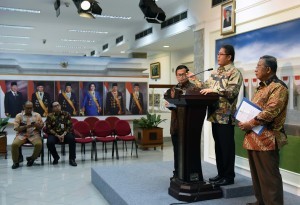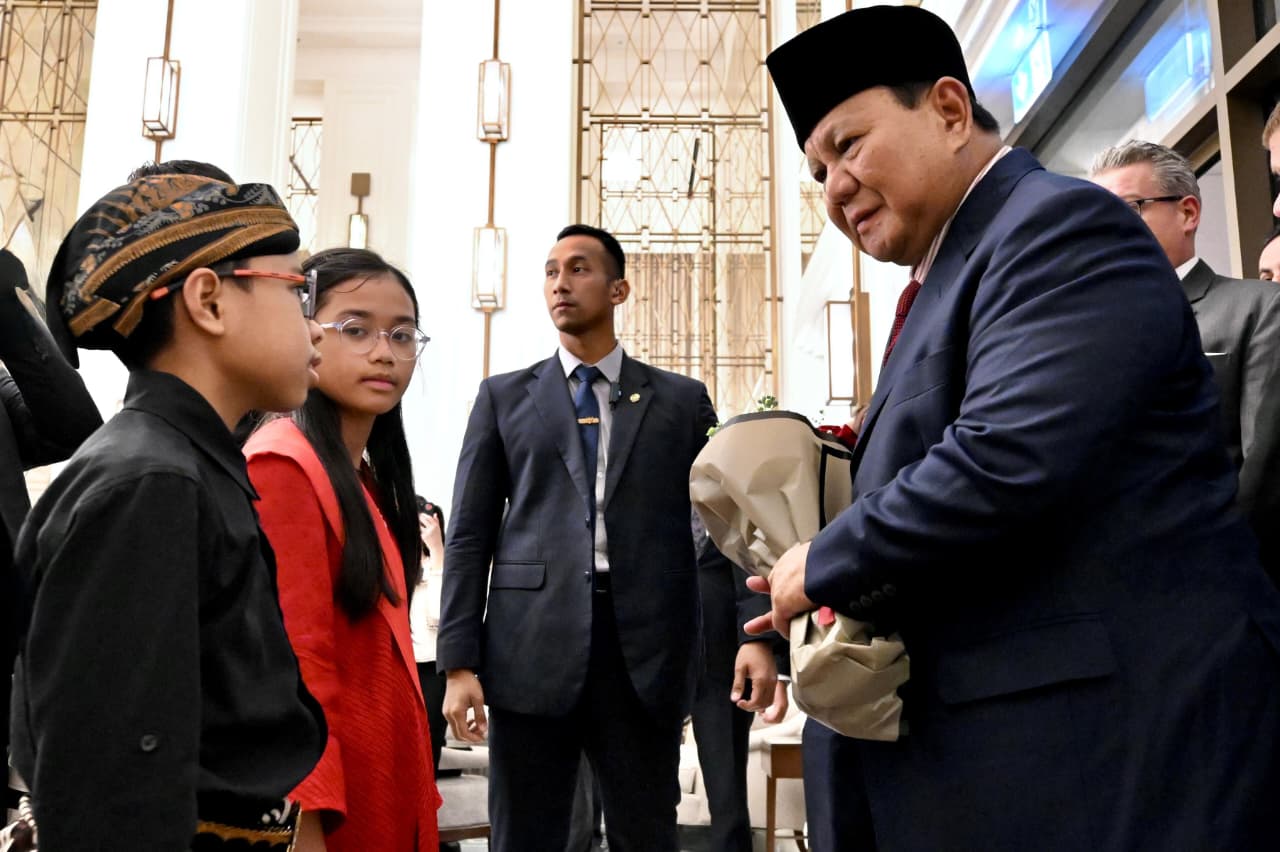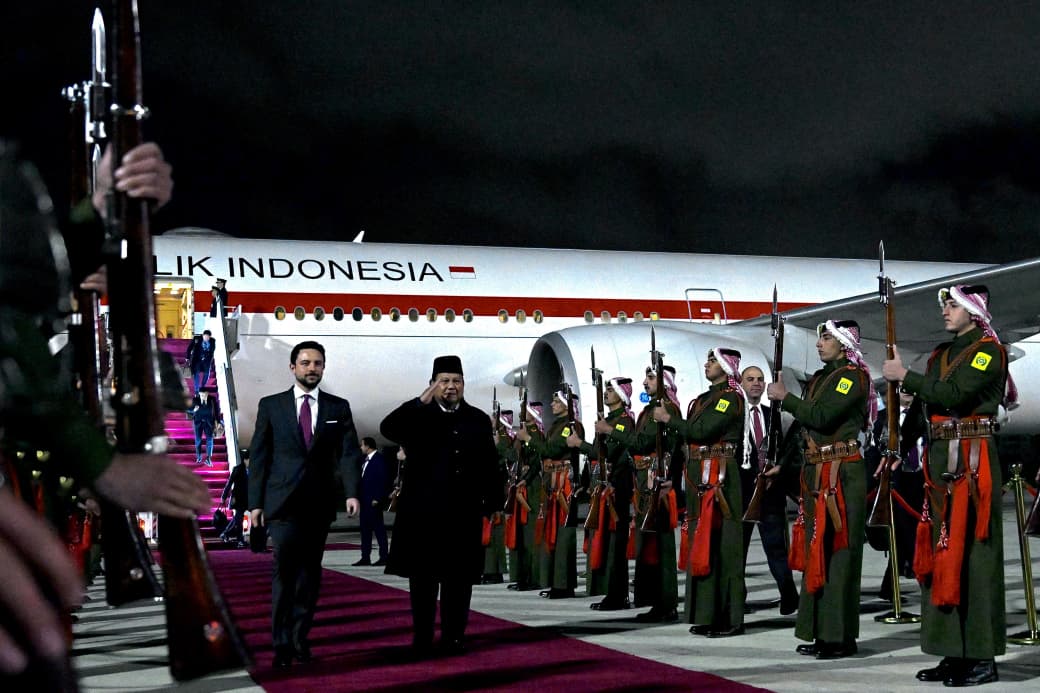Main Points of 14th Economic Policy Package

Minister of Communication and Informatics announced the 14th Economic Policy Package, Thursday (10/11). (Photo by: Public Relations Division/Jay)
The Government has launched the 14th Economic Policy Package on the e-Commerce Road Map.
The announcement was done on Thursday (10/11) at the Presidential Office by Coordinating Minister for the Economy Darmin Nasution, Minister of Communication and Informatics Rudiantara, and Cabinet Secretary Pramono Anung.
Commenting on the new policy package, Pramono said that with the potentials that Indonesia has, it is targeted that through the new policy package, in 2020, 1,000 technopreneurs will be created and the value business of around US$ 10 billion will be reached.
It is also hoped that if the road map can be implemented successfully, the value of US$130 billion in 2020 can be reached, Pramono said.
In the meantime, here are the main points of the package.
Background
One of the Governments visions is to make Indonesia biggest digital economy in South East Asia in 2020.
- Indonesia is currently one of the worlds biggest Internet users with around 93,4 million people and smartphone users that reach 71 million people. With these potentials, it is targeted that 1,000 technopreneurswith the value business of US10 billions can be reached in 2020. The value of e-commerce is estimated to reach US$130 billion.
- However, the national e-commerce road map is not available yet. In fact, the road map can serve as a reference for stakeholders and various regulations that do not stimulate the growth of e-commerce.
Goals and Benefits
- To boost the expansion and improvement of the peoples economic activities all over Indonesia efficiently and connected globally.
- To promote creation, innovation, and invention of new economic activities among youths.
- To provide certainty and ease of doing business in the use of e-commercewith strategic guidelines and direction in accelerating the implementation of electronic-based national trade system in the period of 2016-2019.
- To give priorities and protection for the national interests and micro, small, and medium enterprises (MSMEs) players as well as start-up
- To improve the skills of human resources involved in e-commerce.
- To become a reference for the Government and all stakeholders in formulating or adjusting sectoral policies in a bid to develop e–commerce.
Main Points of the Policy
The e-Commerce Roadmap is stipulated in a Presidential Regulation that encompasses 8 aspects that are regulated, namely:
- Funding. Easing and widening access through the following schemes: a) Smallholder Business Credit (KUR) for the tenants of platform development; b) grants for business incubators that will guide/give assistance for start-ups; c)The Universal Service Obligation (USO) funds for digital micro, small, and medium enterprises (MSMEs) and e-commerce platform start-up.; d) Angel capital, needed when the start-up is still at the valley of death stage in the commercialization stage; e) seed capital from Bapak Angkat; and f) Crowdfunding, that is alternative funding whose funds are collected from certain groups/communities or the general public.
- By providing tax incentives through: a) reduction of taxes for local investors who invest at start-ups; b) Simplifying permits/procedures for e-commerce start-ups whose turnovers are under Rp4.8 billion per year through the implementation of the Government Regulation Number 46 of 2013 on income tax from business received or obtained by Tax payers that has certain gross circulation, so the final income tax is only 1%; and c) giving equal tax treatment between foreign e-commerce businessmen and domestic e-commerce businessmen. Foreign businessmen who provide services and/or contents in Indonesia shall abide by all tax regulations.
- Consumer Protection: a) Harmonizing regulations on electronic certification, accreditation process, policies of payment mechanism, protection for consumers and e-commerce industry players, and the dispute settlement scheme; and b) gradually developing national payment gatewa
- Education and Human Resources: a) promoting e-commerce awareness campaigns; b) designation of national incubator program; c) formulating and improving e-commerce curriculum; and d) improving e-commerce education for consumers, e-commerce players, and legal enforcers.
- Logistic: a) Improving e-commercelogistic system through the National Logistics Blueprint (SISLOGNAS) to further accelerate shipment and cut shipping costs; b) Revitalizing, re-structuring, and modernizing of PT. Pos Indonesia as the provider of national post services; c) Developing outsourcing of e–commerce logistic facilities; and d) developing logistic system from villages to cities with synergy among markets, terminals, commodities, and central market, regional distribution center, and regulating of transportation between villages and cities.
- Communication Infrastructure. Acceleration of the development of high-speed broadband network so that e-commerce can be used all over Indonesia.
- Cyber Security. Formulating national supervisory model in e-commercetransaction and increase public awareness on cyber crimes as well as formulate SOP related to the storing of consumers data, as well as certification for the security of consumers data.
Establishment of Executive Management. Systemic and coordinated efforts for the application of the e-commerce road map as well as monitor and evaluate the implementation of the road map. (Humas Kemenko Perekonomian/ES) (EP/YM/Naster)








